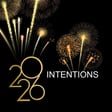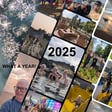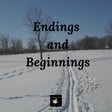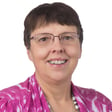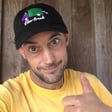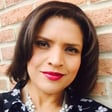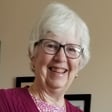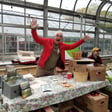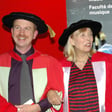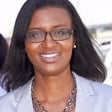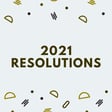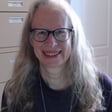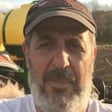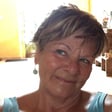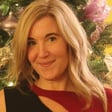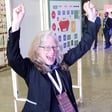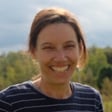Become a Creator today!Start creating today - Share your story with the world!
Start for free
00:00:00
00:00:01

Marian Bulford's Heritage Discoveries
This week on the podcast, I interview Marian Bulford, a genealogist, researcher, indexer and writer. She describes what it's like to discover family secrets as she researches and writes stories about her ancestors.
Transcript
Introduction & Jared Advertisement
00:00:01
Speaker
Experience the Jared difference. The best prices on an amazing selection. Select your diamond gift today from hundreds of styles they're sure to love. Jared. Love brilliantly.
Interview with Marion Bullford
00:00:16
Speaker
My name is Tracey Ariel and I am an apologetically Canadian.
00:00:30
Speaker
And today we're speaking with Marion Bullford. She's a good buddy of mine from the genealogy on song.
00:00:36
Speaker
group. How are you, Marianne? I'm doing very well. Thank you, Tracy.
Volunteer Work in Genealogy
00:00:41
Speaker
So it's very exciting to have other writers on the show. I'm particularly interested in the last story that you did for Genealogy Ensemble about being an indexer, a volunteer indexer. Can you talk a little bit about that? Yes, well that is part
00:01:00
Speaker
Well, there are many public indexes in the world, but I happen to belong to the Mormon Church, the Church of Jesus Christ of Latter-day Saints, commonly known as the Mormons. And on their family history site, they do have an invitation for you to join and do indexing. And as part of the Sunday
00:01:23
Speaker
sermons that we used to go to, most people would do their indexing and their genealogy research on a Sunday afternoon after church and it would be like a family project and I really enjoy it because I find so many interesting items.
00:01:38
Speaker
on the indexing. You can choose the language, you can choose the world, anywhere in the world. You can choose what you wish to download from say civil war people who joined up to more modern day births and marriages and deaths. So it's a very interesting project.
00:01:59
Speaker
Well, and just for people who might not be into genealogy research, just indexing are the lists of people so that if you're looking for a record, you can easily, you can just look up your ancestor and find out whether or not they're in that record. That's usually what it is. Exactly. It's mainly people like us, we index, we send it off to a central place where it's reviewed
00:02:22
Speaker
countless times to make sure it's correct and then it's uploaded to FamilySearch or other, you know, Ancestry.com, MyHeritage, those kind of things. It's all uploaded to them. I don't know if the church sells them. I don't think they do. I think they give this information for free.
00:02:41
Speaker
because it is free on our site and that's how people can do their genealogy by looking for their ancestors that have already been done by indexers such as me.
00:02:53
Speaker
Right. And the family search actually is, they're also the ones who do the annual conference routes.
Role of FamilySearch in Genealogy
00:03:01
Speaker
And they also are, it's a great library if you're looking for information about any historical period, even if you're not doing genealogy, because the records that they have are so encompassing. That's right. They have a lot of records. They
00:03:16
Speaker
I think they were the first in the world because it is one of the tenets of the church that you find and baptise the dead. It sounds macabre, but actually it's to make sure, because the Monas believe that everyone eventually ends up as a family in heaven, if you like, we believe that baptising the dead ensures that we'll all be together one day.
00:03:41
Speaker
as a family again no matter the generation so I mean it's something that they believe in firmly so genealogy research was a big big thing still is and so everyone makes sure that all their families are researched and baptized in the temple of course we don't just baptize anyone it's only our family members we do not baptize people
00:04:06
Speaker
that we do not know or we do not have permission but this is usually a hundred years after their death that they're baptized it's not you know it's something that's done willy-nilly it's very serious and the temple and they have them baptized in absentia and it's it's a wonderful ceremony oh how cool it's uh and i mean for um people like me i mean the the resources that are available because of uh
00:04:35
Speaker
all of that volunteer work is really quite impressive. Because it's really hard.
Genealogy Ensemble & Community
00:04:41
Speaker
I mean, first of all, now, actually, we should talk a little bit about the group that we're part of, the genealogy ensemble group. How did you get involved with them? Well, that was because my friend Claire is also a member, Claire Lindell of the group.
00:04:56
Speaker
And one day I was telling her about the Mormon Church and she said, you know, you should write a story about that. And I said, yeah, I've sort of played with that. I've always written down stuff about the family, you know, little snippets. And she said, I'm a member of a writing group, genealogy writing group. She said, I'm going to ask if you can join. And I said, wow, that would be fantastic. And I got in and I was so honored because this is a group of wonderful women.
00:05:25
Speaker
I mean the fact that nine women can actually get on together and talk and you know critique each other's work without nastiness or bitterness it's a it's a wonderful thing and this group for me has been
00:05:42
Speaker
wonderful, wonderful thing to do to join up with you all. And I feel the same way. I just find it's a glorious group of people, you know, the nine of us are, we get along so well. We're so diverse. It's really a grab bag of people all ages. Different parts of the world. I mean, you know, well, mostly Quebecers, but, you know, there are a couple of us that are not born and bred here, but we certainly feel welcomed. That's for sure.
00:06:08
Speaker
Yeah,
Military Career & Move to Canada
00:06:09
Speaker
yeah. Well, and that's been I guess that's been at least six years now, maybe even more. Yes, I believe it is. Yes. Yeah. Then we've published a book together. And so but in the rest of your life, can you tell me a little bit because I know a little bit about you because of the stories you've written. You've also have a great series on the on your military career.
00:06:35
Speaker
Oh, yes, yes. Yeah, well, that was that happened. Like I was born in Plymouth in Devon in England and my parents divorced when I was seven and my mother remarried. And of course, it was all, you know, it wasn't very pleasant. So when I was 17 years old, I left home and I went to London with a girlfriend and lived with her and her family for a year. When I came home, I was nearly 18.
00:07:00
Speaker
And I was in town in Plymouth one day and I walked past the RAF careers office. And I looked at it and thought, no, you know, that could never happen to me. But the next day I went back and I was trembling from head to foot because I was so nervous. I mean, having left school at 15, my education wasn't that great. But I thought, well, at least I can have a look at it and see what happens. So they gave me a test.
00:07:24
Speaker
And the man there, the officer, said he would let me know. And they sent me a letter in about, I don't know, it was about a month, I'd almost forgotten about it, saying that they thought they had a place for me. I was just over the moon. It was the best thing I ever did. So I went in and I found out all about it, and I decided to document it in my
00:07:47
Speaker
stories on genealogy ensemble and as I say it was the best thing I ever did because I learned such a lot. I had not only a career but I had the discipline and I knew what was going to happen from one day to the next unlike my young life. It was very up and down my young life. It wasn't settled and military was something that was wonderful for me because it gave me structure
00:08:14
Speaker
And I knew where I was going and what I was doing each day. And we had little tests and we had history lesson of the RAF and learned how to march.
Adjusting to Life in Canada
00:08:24
Speaker
Oh, it was just wonderful. Well, and I'll link to some of those stories in the show notes so that people can read them. What did you find difficult about writing the stories? Did you? Did you have? Because I know you've done a good job at making them not just about your own life, but giving general hints to other people so that it's more about an era in time rather than just your ancestors. All right, thank you. This is we're still talking about the RAF now.
00:08:50
Speaker
Well, any of the stories that you write for genealogy because that's a challenge for all of them, right? All right. Well, I keep everything.
00:08:58
Speaker
books from when I was in the Air Force all the lecture books all the lectures and it was wonderful dragging them all out and actually going through them and reading so the the three stories that I wrote about my life in the RAF flowed because I had every available picture photograph books at my fingertips and it was such a pleasure to write it and it opened up a wonderful feeling of wow you know that was a wonderful time didn't I
00:09:28
Speaker
enjoy that. And didn't I do well? I've, you know, as old as I am, I suddenly realized that I did quite well in it. And I did six years and it was wonderful. I really enjoyed it. Well, can you talk a little bit about your life since then? What kind of, I mean, what what's happened after you after you left the military? Well, I left the military after my six years and my husband was still in the military.
00:09:53
Speaker
And we lived outside of the camp in married quarters. I had a civilian job in a doctor's office because I was a medic in the Women's Royal Air Force. So I had a little bit of a job at a doctor's office. Then we got married quarters at another camp.
00:10:12
Speaker
because my husband decided he was going to be an air cartographer. You can change trades within the Air Force. You don't have to stay in the same trade. Prior to that, he was an administrative assistant like a PA to Sir Thomas Prickett at RAF Uphaven, which is where we met. And when he decided to retrain, he was posted to RAF Northalt in East London. And from there, we got married quarters and then we started a family.
00:10:42
Speaker
So I was, you know, looking after the babies for a long time. Now my husband, he joined the Royal Air Force when he was 16 years old as a boy entrant. And he was doing, he signed up for 12 years. But what they didn't tell him was that those 12 years didn't start until he was 18. So in fact, they got 14 years out of him. By the time he'd done about
00:11:05
Speaker
I think it was about 10 years. He said, oh, you know, I'm really fed up with this. I'd like to do something new. So he did what was called, he bought his freedom. You have to pay to get out if you want to leave before your time is up.
00:11:18
Speaker
So he paid for his freedom to come out and we thought, well, what are we going to do now? We had no money, really. We didn't have anywhere to live. Family weren't going to take us in. So he was at work one day and the new desktops, as they were called, had just been installed in the office. And my husband was a sergeant and he went on a training course to learn how to operate desktops, which were of course computers. And he went on this big course and one day someone approached him, a civilian,
00:11:49
Speaker
came onto camp and they had fitted up all the computers and they said to him, you know, have you ever considered leaving the Air Force? And he said, well, I am going to be leaving the Air Force in the next year. You have to work your your passage. You have to work for a year, even though he paid to get out. And this gentleman said to him, we're putting these computers in the International Air Transport Association in Geneva, Switzerland.
00:12:13
Speaker
would you be, if I could sell these computers to the International Air Transport Association and tell them that a air cartographer would be willing to come over and work for them, would you be willing? And my husband sort of, his jaw dropped and he said, yes. So in a few weeks time, it all went very fast. He went over to Geneva, he had an interview, they hired him. And by the next year, we were in Switzerland.
00:12:42
Speaker
And it was like a dream. It really was. We had a wonderful two and a half years there. The boys were in French school. And then the company decided maybe he'd like to be transferred to Montreal, Canada. And we thought, wow, that's a long way to go. We were still in Europe at the time. So then we said, well, why don't we treat it as an adventure and as a posting? Postings were usually three years at a time. If we don't like it, we can move on.
00:13:11
Speaker
Canada's a big country. So we said, yeah, yeah, let's do it. So we arrived in Canada three years. And how old were the boys then? The boys then were about five and seven. Okay. Maybe, no, maybe a little older, maybe eight and nine. Yeah, seven and nine, seven and nine is two years between them.
Life in Quebec & Decision to Stay
00:13:32
Speaker
So we put them into, we were thrilled we were coming to Quebec because we knew it was French speaking and we arrived and we decided to put them in French school, which we did. It was the best thing we ever did because who doesn't want a bilingual child?
00:13:47
Speaker
And we started life in Canada. And what year was that, do you think? What was the timing? Oh, what year was it? 78. Oh, 1978, okay. Oh my gosh, so you've seen lots of stuff since then. Yeah, so you didn't leave.
00:14:05
Speaker
You know, it's funny, we kept saying, yeah, you know, after three years if we don't like, we'll go to Alberta or we go to BC. But you know, we traveled across Canada, you know, like everyone does, the trip from Quebec to BC and you fly into Edmonton and you rent the car and drive to BC. We did all that. We didn't like BC.
00:14:25
Speaker
people oh you'll love BC it's so British yes it was but it was like 35 years old British old snobby ways we didn't like it it rained all the time so we came back to Quebec and we said wow Quebec is so unique it's so different and I love it I love living in Quebec you know I've never had any problems I've had jobs where I've made friends with many many French Canadian people
00:14:54
Speaker
even though my French is appalling. And that's the one regret that I have in life. My one sort of, my challenging failure. You said, you know, what's your most challenging failure?
00:15:08
Speaker
And it's that, that I never learned to speak French properly. I tried, but you know, by the time we got to Switzerland, it was mainly, it was all French and I was doing quite well. I took lessons and I got to know the French people because it was in Switzerland that we joined the church.
00:15:26
Speaker
And of course, Swiss people, and people said to us, the English people and the Americans, oh, you'll never make friends with the Swiss that very close. But we did make some wonderful friends. I had French lessons and I was doing well because it was only French. There was no outlet. It was totally French. And I was doing quite well until I came to Quebec and I could watch TV and English again.
00:15:49
Speaker
oh no but you still haven't perfected your french yet you still have time i say yet but that you did say what's your most challenging failure and that's the french because when we came here we could watch tv in english again uh we could listen to the radio in english um i had lots of english friends in the church and so i failed dismally
00:16:13
Speaker
However, having said that, I have never been without a job in Quebec. Isn't that amazing? Yeah, that's great. I worked for scientific companies, you know, bio-research in San Ando, Bellevue. I worked there for many, many years. And of course, the language of science is English.
00:16:31
Speaker
And I made lots of French Canadian friends. And when I left, I had the biggest compliment paid to me. One French Canadian girl said to me, you know, I never liked English, the English. But she said, after I met you, I changed my mind. And I thought, you're like a representative for everybody. It was so nice. And I burst into tears. I said, oh, I don't even speak French and you're so kind to me, you know.
00:16:58
Speaker
And she said, no, no, you were so kind to me on my first day. You showed me where to go and you helped me out and wished me good luck on my interview. And she said, and you did it all in French, bad French, but you did it in French. So we were laughing. It was so funny, but wonderful, wonderful life we've had here. Oh, that's great. And can you talk about, well, we talked about your failure. What about your success? What are you most proud of?
00:17:27
Speaker
Well, I think what I'm most proud of is the fact that when we came here and we sent the boys to French school, they did all their elementary in French and they had a really good grounding. And then we were able to send them to English high school because we worked for an international company. That was the law at the time. And you could be posted or, you know, sent out of the province at any time. So you were allowed to send your child to school in your mother tongue.
00:17:55
Speaker
Plus when we first arrived, which has changed vastly, was the fact that everything was bilingual here in Quebec in the 70s.
Impact of Mormon Church on Genealogy Work
00:18:04
Speaker
Everyone we spoke to at the airport spoke English. Every sign was big French with English underneath, because I remember going to Eaton's and thinking, wow, I'll be able to learn French because everything's bilingual. And I don't know if you remember that time, but that was something that struck us.
00:18:22
Speaker
Yeah, well, I wasn't in Quebec yet. I was in Ontario at that point. I didn't get to Quebec until 1993. Oh, right. I have to find out your story one day. Yeah. But what can you talk a little bit about some of the adventures you've had since you've arrived in Quebec? Well, yes. Once again, we were still Mormons when we arrived and the Mormon Church then was in St. Louis in Pointe-Claire.
00:18:51
Speaker
St. Louis Avenue. I think it's now a Protestant church or no a Baptist church. Then they built a new church in Kirkland but originally it was the tiny little church in St. Louis. We stayed in the church
00:19:07
Speaker
for after we arrived here at least five or six years. And then for some reason, my husband didn't want to go anymore. And I said, well, that's fine, you know, we're free agents, but I'm going to keep going. I met some wonderful friends, lifelong friends, a particular couple, an English couple that we'd known since we arrived. And they have now moved to Salt Lake City. And that's one of the trips that I took, because once I started doing my genealogy,
00:19:36
Speaker
which again was thanks to the Mormon Church because genealogy is a big thing. I decided that we would go and visit them in Salt Lake City and we went and we visited a graveyard and my granddad is called Percival Victor Obray.
00:20:01
Speaker
Now in that graveyard, there were Obrae's Galore. I could not believe how many of my family names were there. We visited a place called Paradise, Salt Lake City, that our friends took us to. Now I should have backed up really and told you what happened in Switzerland when the Mormon missionaries came to visit us at our door and we invited them in. We were baptized into the church in Switzerland.
00:20:26
Speaker
And the boys in because they were English speaking and it was such a relief to be able to speak English. And they started talking about, you know, they came into what they called teaching and they were talking about the church and they were talking about Salt Lake City. And I certainly remember when I live with my grandparents. I used to take a letter to the post office for my grandfather and it was addressed to someone in Salt Lake City.
00:20:56
Speaker
And in those days, you had the flimsy blue air mail paper that had to be weighed and measured and everything at the post office. So I- Oh yes, I remember those. Yes, yes. So I'd take it down and I'd get it weighed. And on the way home, I think, oh, I must ask Granddad who he was writing to. Well, by the time I got home, I'd forgotten anyway.
00:21:14
Speaker
So this, you know, this memory came back. So I said to the boys, Salt Lake City. So they said, well, who was he writing to? I said, well, I have no idea. I said, but I'll call him tomorrow. So I called my granddad and I said, who was that lady you used to write to in Salt Lake City Grams? He said, oh, that was a second cousin of mine. I said, well, Hilewa, how do you have a second cousin in Salt Lake City, which is a big Mormon place?
00:21:39
Speaker
oh I don't know he said you know what the Americans are like they they love to uh do their genealogy because they all believe that they come from you know Europe somewhere so I said oh that's interesting he said actually I've still got the letters that we exchanged would you like them that's great yes well a week later this big package of letters arrived I started reading them and I began to realize that my grandfather's uncles
00:22:07
Speaker
They were all born in Wales, Pembrokeshire. They were all shipwrights and something to do with shipping in the Navy. That my grandfather's uncle had joined the Mormon Church when it was first established in the early 1800s, had become a Mormon and had gone to Malta and had set up a missionary area in Malta. He was one of the first to bring the
00:22:33
Speaker
Church of Latter-day Saints to Malta and I'm reading all this and I'm showing it to the Mormon missionaries the next time they came and we're all getting excited they said wow you've got a pioneer
00:22:48
Speaker
ancestry. So I said, well, how do you know? And they said, well, look at this. So they, they showed me a family tree, which I'd never seen before. And they pointed out how on the right left side was granddad's family. And on the right were all these Mormons who lived in school. Isn't that wonderful? Oh my gosh. I got the chills. I'm still getting the chills now relating it because it was so exciting.
00:23:15
Speaker
So we started to delve into the genealogy. And I continued when I came to Canada. We went to the Lachine Family History Centre, which is open, you know, 24-7 practically. Well, no, it's open two or three times now because of Covid. But everything there is free, computers, people to help you do your genealogy, if ever you want to go and you have no idea how to start or where to start.
00:23:43
Speaker
all the ancestry and all the big premiere genealogy sites are free at this Lachine place. You said it's Lachine? I thought it was LaSalle. LaSalle, I beg your pardon, it's LaSalle. Yes, it's not Lachine, LaSalle. Thank you for correcting me. So we met our friends there because they at one point were the
00:24:07
Speaker
they ran it they had the keys and every Wednesday afternoon the four of us would go we'd open up the offices and frequently it was just us four not many people came but we'd take our lunch and we'd do our genealogy together and gradually I built up a picture of my grandfather's ancestors who were who were moorlands who went over and went over the plains trekked over the plains from New York on horses and wagons and it was just
00:24:35
Speaker
Oh, it was just incredible to find all this out. Just wish that my grandparents, you know, I tried to tell them but they weren't, they were getting quite elderly then and they weren't that interested in it all. And of course I had to put it on the boil when we on the back burner when we first came to Canada because I was looking for a job and by the time I got down to really doing
00:24:56
Speaker
the genealogy. My parents, my grandparents had passed away, so I regret not being able to tell them all this wonderful news about their ancestors, but I have a feeling they know anyway. Yeah, probably. Because I know they're all baptized and they're all together, so in whatever you like to call it, heaven, paradise, you know, beyond the veil, I tend to believe that they know.
00:25:21
Speaker
So it was very exciting. So when our friends moved to Salt Lake City to be with their family, we went down on a visit and we went to a place called Paradise just outside of Salt Lake City that this grand, this uncle, my great grand uncle, grandfather's uncle, founded in the early 1800s.
Discovering Family History Secrets
00:25:42
Speaker
And we went there for a day trip. And before we went up to the cemetery, we went into a restaurant and we said,
00:25:48
Speaker
we ordered and we said, excuse me, do you know any Obrae's? And one of the girls said, oh yeah, Laura Obrae works here, but she's not in today. We said, really? And they were still around. The Obrae's were still functioning in paradise. It was a tiny little place, of course, but even so, it was exciting to realize that. I'm so grateful for the Mormon Church because
00:26:16
Speaker
Everything about genealogy and writing came from them because when you join the church they encourage you to journal, to keep a journal of everything that happens and you either a few lines a day and my friend she has years and years and years of journals so that when she passes away her grandchildren can read about her daily activities.
00:26:37
Speaker
And I started when I wasn't as clever and good as her, but I've always written. So I kept my journal up until about, I don't know, 10 years ago. And I still am writing because now, of course, I'm on genealogy on sound and I can I can write about my ancestors lives on there, which is terrific. I mean, it's but the Mormon Church, I have a lot to thank for. I don't attend services anymore, but I do consider myself
00:27:06
Speaker
friend of the church because I still do my indexing for them and I still you know talk about them whenever I can and it's it's been a wonderful experience coming to Canada. And well that sort of nicely leads into the last question which you know is do you consider yourself a Canadian and if so what does that mean to you?
00:27:32
Speaker
Well, yes, we took Canadian citizenship three years after we arrived, so we were Canadian. However, I still went, said, I'm going home, and I still call it home, every year to visit friends and family. Well, my youngest son now lives there permanently, so all the years that we've lived here, we have still gone home to England every year on a trip, except this year, of course.
00:28:01
Speaker
My last trip was last year and it's funny because I went to see my son, we stay in with my son in London, and it's a silly little thing but it really stuck in my mind.
00:28:15
Speaker
I plugged my iPad in to the wall, went to bed, woke up next morning. Oh my goodness, it was dead. I thought, why didn't it charge? I said, oh my goodness, Owen, look, my iPad hasn't charged. So he looked at me, he walked over to the wall and he put the switch down. And it was then I realised I'm not English anymore. I forgot that when you plug anything in in the UK, you have to put the switch down.
00:28:44
Speaker
to turn on the power. It's just a small thing. And it just suddenly washed over me.
00:28:53
Speaker
My goodness, I'm not English anymore. This is ridiculous. A simple thing like that. But there were other little tell-tale signs that I wasn't, you know, stuff that Owen said, you know, we'll go and do this. And I'd say, really? You mean you do that? You know, type of thing. It was every time I went back for the past three years, there were signs that
00:29:16
Speaker
I didn't realise happened anymore in the UK. Just little bits and bobs. But when that happened, when I'd forgotten to put the switch down, I thought, that's it. I'm not British anymore.
00:29:30
Speaker
And the other day I was out with a friend when we were miles from each other, of course, but we sat by the river in the fall and we were, you know, shouting at each other, talking. And I said something, and she said, oh, you're a real Canadian. You just said, you know, what time is it or eight or whatever it was I said.
00:29:51
Speaker
And I said, really? You know, we were laughing about that. And then, of course, a year later, I go to England and I forget to put the switch down because everybody conserves power that way at home. Every every power outlet has a switch next to it. And when it's up, the power isn't flowing. When it's down, the power is flowing. Even when you plug in a kettle.
00:30:13
Speaker
when you plug in your vacuum cleaner. That actually sounds like a smart way to be. I think we waste quite a lot of power here. Yes, we do. And that was one thing we noticed when we first arrived. We went downtown one night, every single window.
00:30:29
Speaker
in office blocks and shops was a blaze with lights. And we said, my goodness, don't they waste a lot of power here? Because growing up at the end of World War II in England, shortages were acute. So everything was conserved. Water, power, food, clothing. We had to be very, very careful. And the differences when we came to Canada were quite astounding. I remember I
00:30:59
Speaker
went shopping for a grocery shop, and I took all my own bags with me, and I got really peculiar looks. It was funny. Oh my gosh, but you still did it. You still kept doing it, right? Yes, I did. I was embarrassed because they said, you know, paper or plastic, and I'm thinking, what is he talking about?
00:31:20
Speaker
also in England we pack our own goods you know it goes down on the conveyor belt and you stand at the end you pack them or having someone saying paper or plastic and packing it for me wow this luxury indeed well we're heading the other way now actually I don't think it I don't think it's very often you get your stuff packed for you anymore that's right it's all sort of going back to the way it was in England when I left
00:31:50
Speaker
Oh my gosh, was there anything that I didn't ask you that you had been helping to talk about? No, I don't think so. I think we've done it all.
00:32:00
Speaker
Oh, you did ask me if I had a favourite story. Ah, yes, that's true. So do you? Yes, I do. The ones are about my grandma. Because my grand's birth, the family secret, turned out she was illegitimate and she didn't find out until she was about 65.
00:32:21
Speaker
That was a heart-rending thing because I was living with them still and we went on a day trip to see great-grandma, her mother, and she needed her birth certificate because she wanted to be baptised into the Church of England because of course she'd never been baptised. She was a big member of the Church and also she was coming up for 65 and she needed her birth certificate to claim her old age pension in Britain. We went up on the train to see great-grandma
00:32:49
Speaker
And Great Grandma had never had much time. Is this okay? Am I? I'm not going a bit. Okay, so Great Grandma had never had much time for my mother. She was always very cool and a bit caustic towards Mum. And she didn't like me very much either. And young as I was, I felt that children are aware whether adults like them or not. I thought, well, a train trip, it's going to be great, you know, and I can see my cousins.
00:33:14
Speaker
So we had a wonderful day. And on the way back we had the carriage, the train carriage to ourselves. And Granny was sitting in the corner and I said, wasn't that a great day, Gran? I really enjoyed it. And she burst into tears. And I was only about 13 and it was a shock to see my Granny crying. So I, you know, I put my arm around her and I said, Gran, what's the matter? Are you okay? She blew her nose and said, I'm a bastard.
00:33:41
Speaker
I was astounded. I said, what? I mean, first of all, that word was, you know, a horrible word to use. And she said, they never got married and I'm about. And I said, what do you mean? So she told me that when she confronted her mother, Grandma Lillian, and asked for a birth certificate, she burst into tears.
00:34:00
Speaker
and said, oh, my God, I hope that I'd be dead before you found out. And Gran said, found out what? And she said, you know, I you were illegitimate. And when I got your birth certificate, it had illegitimate stamped across it, you know, big high capital letters. And she said, I ripped up the birth certificate and I threw it away and hoped I'd never have to confront it again. So she said, you know, I've lived too long and here you are finding out now.
00:34:29
Speaker
So gradually the story came out. She went out with a sailor. He left for sea and in those days they'd go to sea for two, three years at a time. And her parents tried to trace him in the Navy, but they couldn't. Or I think they must have because when he came home again, he contacted Grandma Lillian and they got married. So Grandma
00:34:56
Speaker
Yes, she was illegitimate for a few years, but she wasn't, you know, the parents eventually got married to each other three years. Great, great. But I praised them. I did the story and I found out that poor old Granny was born in what they called a work house because of the shame and what were the neighbors think and all those things that people do and say.
00:35:21
Speaker
So grandma was born in the workhouse. I obtained her birth certificate. And from there, I thought, whoa, that would make an interesting story on genealogy on Psalm. So I wrote it and called it the family secret. Wow. What an emotional secret it was. It was, yes. And then the second one I wrote, which I am, you know,
00:35:46
Speaker
very happy with and, you know, it's nice to sort of read it again. It was called, Granny was in the Ren's. Oh yes, I remember that one. And she cut her hair off to join the Ren's and I still have that plait of hair. Really? Yes, and I put it in the story. There's a picture of her hair at the top of the story. Oh, I didn't remember that part.
00:36:12
Speaker
Yeah, it's Grandma's plan. And Dorothy, another of our writers, Dorothy Nixon said, I should put that picture at the top of the story. And when I did that, that really made it. It was, you know, as I say, this is a wonderful group of women who give such, you know,
00:36:29
Speaker
criticism but it's very, you know, positive criticism and it helps and it's wonderful. I've had so... Oh yeah, I mean, you never stop growing as a writer. That's what I love about it. That's right. It's just an exploration all the time. You can always improve. Yes, I believe so too. And improve I have with you and Janice and Dorothy helping and everybody's input. I mean, it's just amazing what I've learned.
00:36:58
Speaker
And I started writing actually when I was quite young. I did a story when I was about 11 called Adventurous Holiday. It was written on a little exercise book that my gran had bought me. So I was always sort of writing little stories, but it wasn't until I joined this group that I really blossomed into, you know, being able to write underline inverted commas because
00:37:28
Speaker
I mean, I'd always written in my journal, like I said, but not for publication. But not for publication. I was so nervous. Wow. And now you're doing it all the time. And it's wonderful. It's a wonderful group of people.
00:37:43
Speaker
It is a wonderful group of people. I really, really enjoy the group. And actually, I have a link to Dorothy's podcast too, because I've already interviewed her and I've already interviewed Mary as well. So eventually we'll have all seven podcasts available. Eight, because I'm sorry, eight, but not me. I'm here. I'm on every single one.
00:38:09
Speaker
Yes, but you're not talking about you. That's the difference, you see. No, I do talk about me on some of them because I do a little excerpt at the beginning. And I also have some podcasts that are just about my creative entrepreneurial journey. Oh, wonderful. Yeah. Unapologetically Canadian. Yeah.
00:38:29
Speaker
Yeah, that's the Unapologetically Canadian is the podcast.
Conclusion & Podcast Wrap-up
00:38:33
Speaker
You can listen to it on any podcast thing. I'll send you the link. I mean, well, you'll get the link because you'll have your podcast, but you can go back and listen to any of them. There's now, you'll be number, I don't remember, I think you'll be number 50 or something like that. Anyway, I just published the 47 today.
00:38:50
Speaker
Oh, how amazing. Wow. Yeah, it's very fun. And not everybody's a genealogist. Some people are other creative entrepreneurs. Some people are marketing experts. Some people are financial experts. Basically, I'm trying to to interview everybody who is basically a creative entrepreneur in one sense or another in Canada. It's all and then I have interviewed somebody about about Canada itself, too.
00:39:20
Speaker
Well, that sounds interesting. I must listen to them because let's face it, everyone loves to talk about themselves, don't they? They do. Well, thank you very much. And I'm just going to stop the recording, but stay on for another second, couple seconds, OK? Thank you. Thank you so much. I really appreciate your time. You're welcome. It's a real pleasure. Thank you.
00:39:41
Speaker
Thank you for listening to Unapologetically Canadian. Please consider supporting our podcast for $2.99 a month. Join select listeners and get additional episodes every month.
Closing Jared Advertisement
00:40:04
Speaker
At Jared, we have a brilliant selection of beautifully crafted diamond engagement rings and certified loose diamonds so that you can find the perfect one for your one and only. Best selection, best prices. Enjoy the Jared difference today. Jared, love brilliantly.

